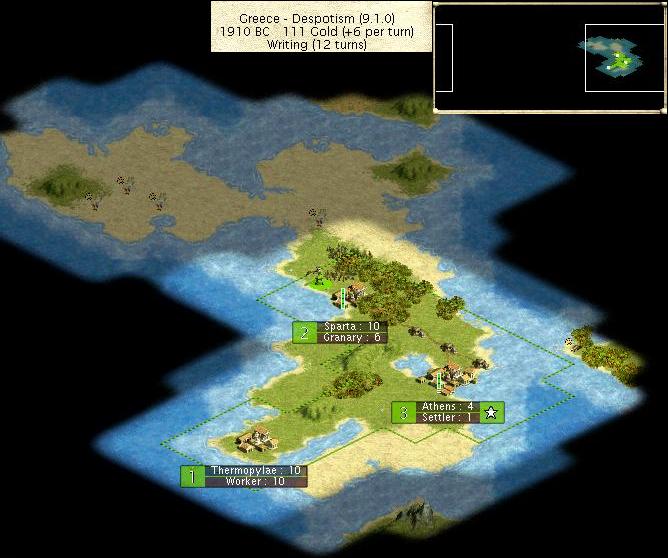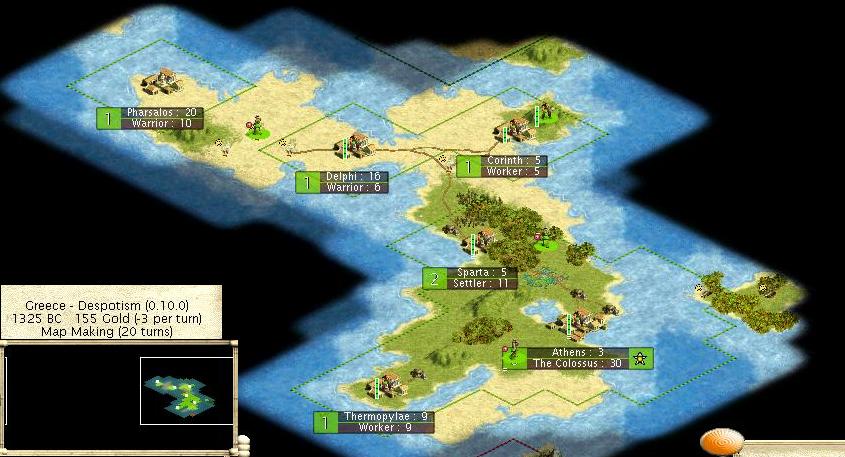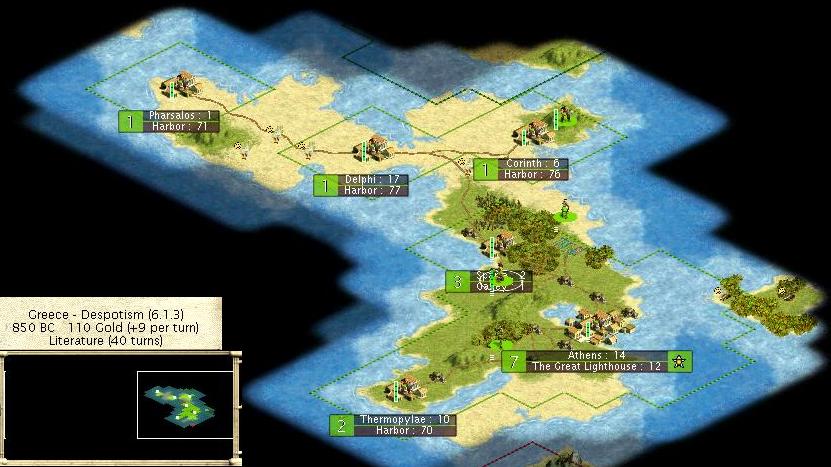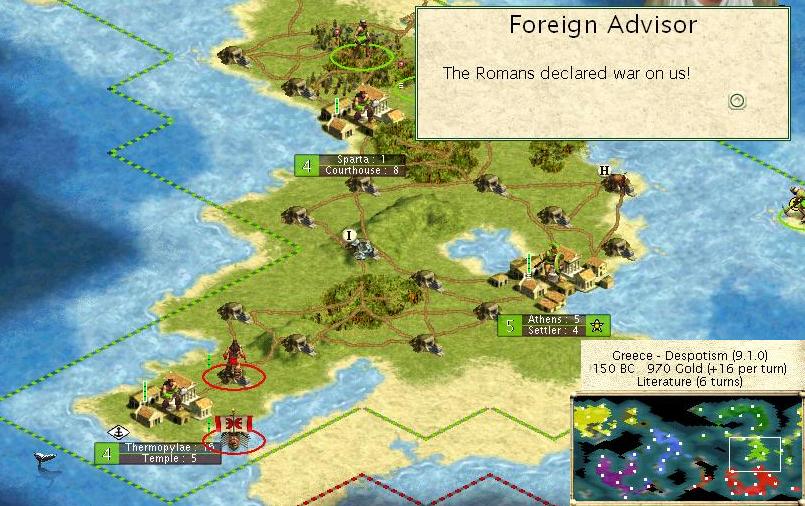

Now that I had completed the "A" game with a successful spaceship victory, I now had the goal of attaining a diplomatic victory in the "B" one. I reopened the 4000BC save file for that game and decided to found on the starting tile again, just as I had in the other game. It was a freshwater spot that was also on the coast (a big deal for an archipelago map), and had a couple of bonus grasslands in range. Not the most ideal spot, but I've worked from much before as well. Production was set to a warrior, research pointed towards Pottery for a granary as is my usual path.
My first warrior arrived in 3750BC and was sent out exploring to the north. The second one went to the south in 3500BC when it was produced. It quickly became apparent that I was on a small island. A very small island. But not entirely alone: the sole goody hut on my island gave me barbarians in 3400BC. By 3000BC, I had a pretty good idea of what the island I was on looked like. There was room enough for about a half-dozen cities, but only a few worthwhile grassland tiles. The rest was all desert, with a few hill tiles thrown in. It was a very low-food start; most cities I would found would be stuck at size 2 until I could build harbors in them. What a lousy position, to be marooned on a desert island! I needed to get off this island as soon as I could and hopefully find better land. Here is the repeat picture of my capital in 3000BC from the title page:
This image has been lost.
Don't let that picture fool you, as what you see is pretty much the entire extent of the non-desert tiles on my island. The decision to research Pottery first in a situation where I clearly had a desperate need for Map Making may perhaps be questioned, but it proved to be highly beneficial for me. In such a dry start, the granary that I built in Athens was more needed than ever to pump out settlers for the rest of my civ. All but one of the cities I built in this game ended up coming from Athens, since there just wasn't enough food to produce them anywhere else. Despite the situation, I decided to follow my usual tech route and research Writing at a 40-turn min science rate. I couldn't get it faster than 32 turns even at 100% science, and this would allow me to build up cash for a later push at Map Making. This was one of the places where the commercial civ trait really paid off; this game would have been much harder had I lacked Alphabet as a starting tech.
My second settler was produced in 2670BC, the same turn I verified that I was on an island by reaching its western terminus. Sparta was founded in 2550BC in an overlapping spot with Athens in order to reclaim some of its good tiles. The horrendously low-food land more than justified this action. Athens and Sparta were to be the only cities with a "normal" level of production throughout the entire game; pretty much everything else was to be a fishing town. This was shaping up to be a very unusual game. Third city was produced in 2110BC and founded as Thermopylae in 1910BC. Far from being the glorified Thermo of the "A" game, this Thermo was a small fishing town that had the luxury of owning a couple of grassland tiles as well. That was more than most cities would get. Here's the first picture of the desert island that my people called Greece:

I think the picture speaks for itself. Anyone who thinks I was overexaggerating the poor quality of the starting position has only to look at that land for themselves. Yuck. Well, we don't have much but we Greeks are fiercely protective of what we do have - so let's settle what's left of this island and then grab some real land off of it! And we know that there are others out there; shortly after taking this picture, a green border appeared on the island to the north peeking out from under the fog. It was the Aztecs, though they refused to move any units into range to make contact across the water for a very long time. Corinth was founded in some truly desolate land in 1700BC; its highest food producing tile was a solitary hill tile! Yuck.
Writing was discovered after 40 turns in 1500BC. Now that I had a sizeable treasury built up, I switched research to Map Making and turned the rate up to 100%. I had plenty of cash to reach the tech before going bankrupt, evidence of the effectiveness of the min science srategy. In 1325BC I founded Pharsolus and completed the settlement of my starting continent. Here's the picture of the lovely sight that beheld my eyes at that point:

So let's see what we have here in terms of cities. Athens and Sparta have enough decent land to function as normal cities, with average production and commerce. Thermo is a glorified fishing town in this world, with a whole two grassland tiles of its own to use. The other cities have considerably less to work with; Corinth, Delphi, and Pharsolus are all pitiful fishing towns utterly worthless until they can construct harbors. None can get more than 1 shield/turn; even with irrgation, those desert tiles can't produce more than 1 food until the advent of Steam Power. So I have two overlapped cities, one fishing town, and three cities weak even by fishing town standards. And with this I would have to conquer the world... at least diplomatically.
On the plus side, the Aztecs were clearly to the north and the Romans to the south, even if I hadn't made contact yet. There was an island with two furs just to the east of Athens that would allow for a nice city. And Athens, with no more settlers to produce, was prebuilding for the Great Lighthouse with the Colossus, so I could expect to grab that and be able to settle lots of sites overseas. With Greece's commercial trait, I would have better luck managing overseas corruption too. The game was by no means going to be impossible (though this would be a tricky one on Deity).
Between 1325BC and 850BC nothing happened. I founded no new cities, contacted no one, and my cities barely grew at all except for Athens and Sparta. In 850BC I researched Map Making and set out to find the world; Sparta went over to galley production and Athens was switched to the Great Lighthouse, due in 12 turns. All my colony cities in the northern desert went from granary prebuilds to their proper harbors. Here's the largely unchanged picture from that date:

Now I would be able to find everyone first, and broker contacts between the other civs, or at least so I hoped. The Aztecs finished the Oracle in 825BC, and I hoped that no one cascaded to the Lighthouse. My first galley out of Sparta headed around the western edge of my island and went to make contact with Montezuma, reaching him in 775BC via the Delphi canal. Monty had many, many more techs (mostly first tier cheap ones) but no contacts with anyone else. He also lacked Map Making; since I wanted to be able to settle any nearby islands, I declined to trade it away for techs. The Aztecs had a pretty sad island as well, mostly tundra and hills, but it was marginally larger and of better quality than mine. We were both pretty screwed for the most part though.
In 670BC, I moved a settler produced out of Sparta across to the fur island and founded Knossus. It looked as though there was another island to the east of that, larger and with a TON of jungle on it. Well jungle isn't the best stuff either, but at least it can be improved with workers into something useful. I contacted Rome in 630BC and found that they were much larger than me. After trading maps, it became clear that Caesar also had MUCH better land then me; he had normal terrain down there. Hey, no fair - Sirian said there would be no lemon starts on this map! Why did I get one? Actually I didn't mind the lousy start at all, as it was making this game much more interesting, but it grated a bit to see that the other civs were in the lap of luxury compared to my poor hardy Greeks.
I built the Great Lighthouse without incident in 590BC, giving me a serious advantage when it came to exploration. It also appeared as though I had reached Map Making just a few turns faster than the AI civs, which was all it took to get the edge in contacts. It turned out that I didn't need the Lighthouse to make contact with the other civs, but it was hardly a waste as Athens would have sat on Wealth with nothing to build otherwise. I met the Zulus in 610BC, discovering that Shaka also had a larger, much stronger starting island than I did. By now I knew that each civ would have its own island, with Sirian rolling maps until we got a true archipelago one for this game. Contact with the Germans followed in 510BC and the Iroquois in 410BC, at which point in time I knew everyone in the world. I decided not to trade away contacts, since I was able to catch up in tech completely through trading maps around and using the subsequent cash to buy the techs I needed. I quickly became the world tech leader, and my treasury climbed to over 1000g by stealing all of the cash that the other civs had accumulated. That money was useless now, but would become very helpful when I got into a Republic and could rush things. Settling continued throughout this period (though without very detailed notes), as I filled in new cities on a series of islands to my east. Sorry for the lack of detail, but the game was pretty peaceful and uneventful. At least until...

Ahhh that Caesar, will he never learn? Or more to the point, will I ever learn not to guard my cities with just warriors? In any case, this time my veteran warrior defended successfully and I kept Thermopylae (to think that he promoted by surviving a barb attack in 3400BC! The game is weird sometimes...) But once again I was at war with Rome in the ancient age - is it Groundhog Day already?






